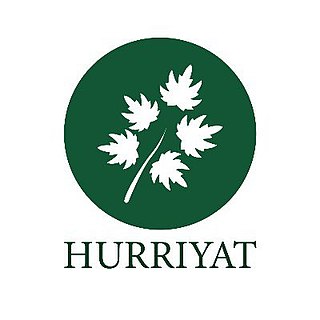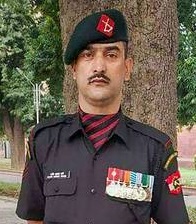
All Parties Hurriyat Conference (APHC) is an alliance of 26 political, social and religious organizations formed on 9 March 1993, as a united political front to raise the cause of Kashmiri independence in the Kashmir conflict. Mehmood Ahmed Saghar was the first convener of the APHC-PAK chapter when the alliance was established in 1993. The alliance has historically been viewed positively by Pakistan as it contests the claim of the Indian government over the State of Jammu and Kashmir. The organisation is split into two main factions, those being the Mirwaiz and Geelani factions. Mirwaiz Umar Farooq is the founder and chairman of Mirwaiz faction and Masarat Alam Bhat is the interim chairman of Geelani faction, who succeeded Syed Ali Shah Geelani, the founder of the faction after his death.

The insurgency in Jammu and Kashmir, also known as the Kashmir insurgency, is an ongoing separatist militant insurgency against the Indian administration in Jammu and Kashmir, a territory constituting the southwestern portion of the larger geographical region of Kashmir, which has been the subject of a territorial dispute between India and Pakistan since 1947.
The 1998 Wandhama massacre refers to the killings of 23 Kashmiri Hindus in the town of Wandhama in the Ganderbal District of Jammu and Kashmir, India on 25 January, 1998. The massacre was blamed on the militant outfits Lashkar-e-Taiba and Hizbul Mujahideen. The victims included four children and nine women.

The Jammu Kashmir Liberation Front (JKLF) is a formerly armed, political separatist organisation active in both the Indian-administered and Pakistani-administered territories of Kashmir. It was founded by Amanullah Khan, with Maqbool Bhat also credited as a co-founder. Originally a militant wing of the Azad Kashmir Plebiscite Front, the organization officially changed its name to the Jammu Kashmir Liberation Front in Birmingham, England on 29 May 1977; from then until 1994 it was an active Kashmiri militant organization. The JKLF first established branches in several cities and towns of the United Kingdom and other countries in Europe, as well as in the United States and across the Middle East. In 1982, it established a branch in the Pakistani-administered territory of Azad Jammu and Kashmir, and by 1987, it had established a branch in the Indian-administered Kashmir Valley.

The Kashmir conflict is a territorial conflict over the Kashmir region, primarily between India and Pakistan, and also between China and India in the northeastern portion of the region. The conflict started after the partition of India in 1947 as both India and Pakistan claimed the entirety of the former princely state of Jammu and Kashmir. It is a dispute over the region that escalated into three wars between India and Pakistan and several other armed skirmishes. India controls approximately 55% of the land area of the region that includes Jammu, the Kashmir Valley, most of Ladakh, the Siachen Glacier, and 70% of its population; Pakistan controls approximately 30% of the land area that includes Azad Kashmir and Gilgit-Baltistan; and China controls the remaining 15% of the land area that includes the Aksai Chin region, the mostly uninhabited Trans-Karakoram Tract, and part of the Demchok sector.

Kashmir Solidarity Day is a national holiday observed in Pakistan on 5 February annually. It is observed to show Pakistan's support and unity with the people of Indian-administered Jammu and Kashmir and Kashmiri separatists' efforts to secede from the Indian Republic, and to pay homage to the Kashmiris who have died in the conflict. Solidarity rallies are held in the Pakistani-administered territory of Azad Jammu and Kashmir, Pakistan and by Mirpuri Kashmiris in the United Kingdom.

The 2010 Kashmir unrest was a series of violent protests and riots in the Kashmir Division, Chenab Valley and Pir Panjal regions of Northern Jammu division of Jammu and Kashmir, India. It began in June 2010 after the Indian Army claimed to have killed three Pakistani infiltrators. However, it was later revealed that three young men from Nadihal village in Baramulla district were killed in a staged encounter at Sona Pindi by a soldier of the Territorial Army, a counter-insurgent, and a former special police officer. This incident, later known as the Machil fake encounter, sparked outrage across the region, contributing to the violent protests that followed.
Human rights abuses in Jammu and Kashmir range from mass killings, enforced disappearances, torture, rape and sexual abuse to political repression and suppression of freedom of speech. The Indian Army, Central Reserve Police Force (CRPF), and Border Security Personnel (BSF) have been accused of committing severe human rights abuses against Kashmiri civilians. According to Seema Kazi, militant groups have also been held responsible for similar crimes, but the vast majority of abuses have been perpetrated by the armed forces of the Indian government.
Human rights abuses in Kashmir have been perpetrated by various belligerents in the territories controlled by both India and Pakistan since the two countries' conflict over the region began with their first war in 1947–1948, shortly after the partition of British India. The organized breaches of fundamental human rights in Kashmir are tied to the contested territorial status of the region, over which India and Pakistan have fought multiple wars. More specifically, the issue pertains to abuses committed in Indian-administered Kashmir and in Pakistani-administered Kashmir.

Burhan Wani was the leader of Hizbul Mujahideen, an Islamist terrorist organization and terrorist group of the Kashmir conflict. He had become a popular figure amongst the local Kashmiri populace, having done so primarily through a strong social media presence, and was responsible for moulding the insurgency in Jammu and Kashmir into a youth-oriented movement. Wani was a terrorist leader and had reportedly recruited numerous foot-soldiers through his personal efforts.
Farooq Ahmed Dar known by his nom de guerre Bitta Karate, is an Indian Kashmiri militant, who currently serves as the chairman of the Jammu Kashmir Liberation Front (R) in the Kashmir Valley of Jammu and Kashmir, India.
A by-election was held in the Lok Sabha constituency of Srinagar on 9 April 2017 with repolling in 38 polling on 13 April. It was triggered by the resignation of Tariq Hameed Karra after his defection from Jammu and Kashmir Peoples Democratic Party to the Indian National Congress.

Stone pelting in Kashmir refers to stone throwing by Kashmiris on the Indian forces and Jammu and Kashmir Police deployed for crowd control in Jammu and Kashmir to support the separatists, insurgents. In the local language, it is termed as "Kanni Jung", which means fighting with stones and the stone pelters are called as Sangbaaz or Pathraw Player. However, in the recent past the number of stone pelting has dropped significantly.
The Kashmir conflict has been beset by large scale usage of sexual violence by multiple belligerents since its inception.

Lance Naik Nazir Ahmad Wani, AC, SM & Bar was an Indian Army soldier and a recipient of the Ashoka Chakra, India's highest peacetime military decoration. At the time of his death, he was serving with an auxiliary battalion of the army's Jammu and Kashmir Light Infantry Regiment, the 162nd Infantry Battalion of the Territorial Army. He was posthumously awarded the Ashoka Chakra for his actions during a counterterrorism operation in which his unit was attached with the 34th Rashtriya Rifles battalion. He was the first recipient of the Ashok Chakra from Jammu and Kashmir.

Media in Jammu and Kashmir comprises a diverse landscape of print, electronic and digital media outlets. The region is served by a variety of newspapers, television channels, radio stations, and online news platforms, reflecting the cultural and linguistic diversity of the area.
Kashmir human shield incident occurred on April 9, 2017, in Jammu and Kashmir during the Srinagar Lok Sabha by-election. A 26-year-old man captured by the Indian Army, was tied as a human shield to the front of a Jeep belonging to Indian Army as a column of Indian troops was moving through a locality. The man was reportedly tied to the vehicle to dissuade other Kashmiri protestors from hurling stones at the Indian troops. The man was accused of being involved in throwing stones at Indian troops. The Government of India stated that it would stand by the officer who decided to use the "insurgent" as a human shield.
Machil fake encounter, also known as Machil encounter case, refers to a extrajudicial killing which was carried out by the Indian Army on 29 April 2010 by killing the three Kashmiri civilians Shazad Ahmad Khan (27), Shafi Ahmad Lone (19) and Riyaz Ahmad Lone (20) and labelled them as Pakistani militants. Considered as one of the biggest human rights abuses in Jammu and Kashmir since insurgency began in 1947 between India, Pakistan and China, the trio were killed in Machil area of Kupwara district, Jammu and Kashmir at the Line of Control (LoC).








